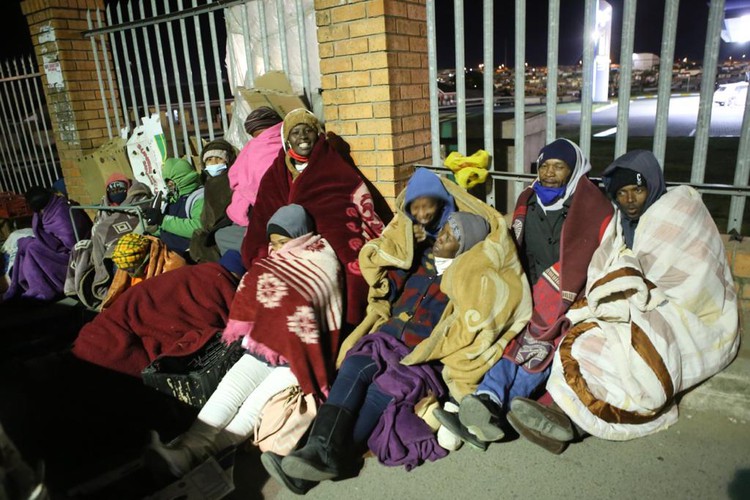
23 August 2024
A queue outside the SA Social Security offices in Mdantsane, East London. The number of babies getting the Child Support Grant is falling, says a team of researchers at the University of Cape Town. Archive photo: Johnnie Isaac
Fewer babies are getting the Child Support Grant (CSG), though poverty rates are rising, according to a recent report by the Children’s Institute at the University of Cape Town.
The CSG, introduced in 1998 to alleviate child poverty, has become a crucial source of income for millions of South Africans, but it is not keeping pace with inflation, and there are problems with access, they say.
As of March 2023, the SA Social Security Agency (SASSA) was disbursing the CSG to just over 13 million children under 18 years old. However, increases in the grant amount—from R480 per month at the end of March 2023 to R530 by April 2024—have not kept pace with rising food prices, causing the grant’s real value to erode significantly, the researchers say. The current value of R530 per month no longer covers the minimum nutritional needs of a child, raising concerns about the grant’s ability to support poor families effectively.
Senior Researcher at the Children’s Institute Dr Katharine Hall said despite the increases in the CSG, “there’s been a regression in the real value of the CSG”. “South Africa is facing a crisis of child malnutrition, which in turn affects health, learning and all areas of development. The CSG needs to be restored to the food poverty line,” said Hall. The food poverty line is currently at R760.
The report also noted a “worrying” decline in the number of infants (under one year of age) receiving the CSG each year, while poverty rates have risen.
The number of infants receiving the grant dropped from 658,000 in March 2020 to 468,645 in March 2024. The decline, particularly pronounced since the Covid pandemic, has reversed previous gains in infant grant uptake.
Hall said researchers first noticed a decline in the number of infants getting the CSG when comparing the March 2021 grant statistics with March 2020 (just before Covid lockdown).
This did not come as a surprise, Hall said, since all Home Affairs offices were closed during the hard lockdown and births could not be registered at all, creating backlogs.
“When StatsSA published the birth registration numbers for 2020 (in late 2021), we could see a clear drop in early birth registration. This would have affected CSG uptake for infants, as one of the documents required when applying for a CSG is a birth certificate,” said Hall. Between 2020 and 2021, the number of infants receiving the CSG dropped by over 100,000 and it has declined since.
Hall said it is still unclear why the number of infants receiving the CSG continued to decline after 2021, even though early birth registration picked up again after the lockdown.
“Year-on-year, the number of infants receiving a CSG has decreased, and in March 2024 only 470,000 CSGs were paid for infants – a 29% drop since pre-Covid levels. Child poverty rates have risen over the same period, so this is not about eligibility – it’s about obstacles to access. It’s still unclear what those obstacles are,” she said.
Hall said it did not seem that the drop in CSG uptake for infants had been driven by declining births.
“The biggest drops in CSG numbers are in the Gauteng and Western Cape – where the number of infants receiving the CSG decreased by 35% and 48% respectively between 2019 and 2024. These are also the provinces with the fastest growing child populations, according to the models. They are also the provinces which have historically had the biggest errors of exclusion. All of this suggests that the problem is related to obstacles in access, which needs further investigation.”
Hall said increasing CSG access for infants has for years been a performance target for the Minister of Social Development, and a key indicator in the Medium-Term Strategic Framework. But she said first step towards improving the situation was for the Department of Social Development and SASSA to recognise things had got worse.
A way to improve early uptake would be to pre-register pregnant women so that all the administrative work is done before the child is born, with the CSG starting automatically as soon as the birth is registered.
But since this would be a “new innovation” that still requires a birth certificate, Hall said Home Affairs needs to expand its footprint in maternity clinics, improve efficiency, and ensure birth registration services are prioritised at its offices.
“But it may not all have to do with early birth registration: SASSA also needs to investigate and reduce the obstacles to grant enrolment,” she said.